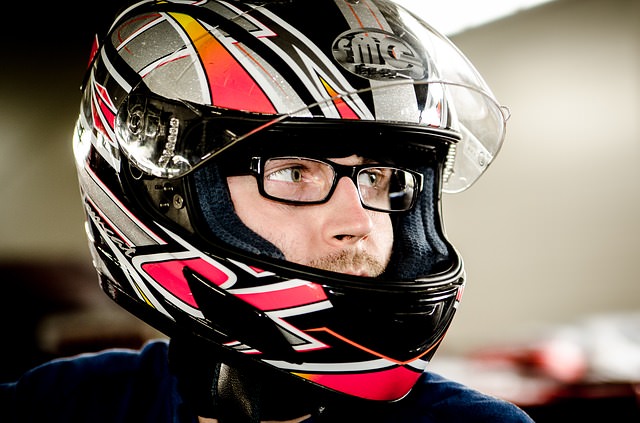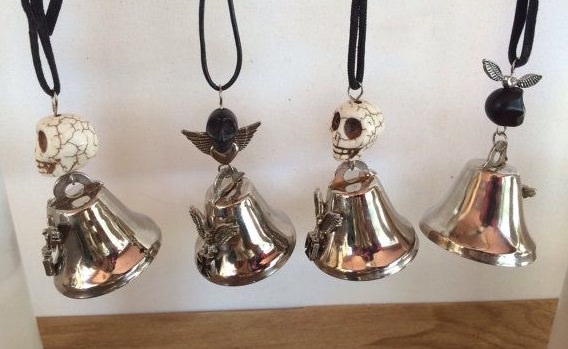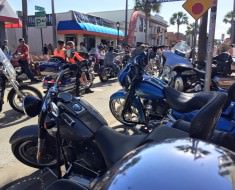Motorcycles enjoy a colorful history filled with extraordinary characters. Both of these grow day by day and not surprisingly, this rich two-wheeled lifestyle has born many myths and superstitions, all handed down from bike night to motorcycle rally.
In our collective years of riding, we have all heard many of these different myths and superstitions and often wondered of their authenticity, truths or even origins.
Helmets
There is a superstition and myth in our riding world which are much the same, both involve dropping a motorcycle helmet. One calls it bad luck for a rider to drop their helmet, even once, from any distance.
“As goes your helmet, so goes your head,” is the superstitious saying, which falls in line with popular myth of a rider replacing their helmet if it’s dropped, regardless of the height it falls from or what it lands on. While bikers are free to hang onto their superstitious beliefs, the myth of replacing a fallen helmet is just that, a myth.
There are two organizations with recognized safety standards for motorcycle helmets in the United States, the Federal Government’s Department of Transportation (DOT) and the Snell Memorial Foundation.
The Snell Memorial Foundation answers the general question of ‘I dropped my helmet! Do I have to go buy a new one?’ with ‘Generally the answer is probably not. Helmets are one-use items, but are quite durable otherwise, at least the ones we certify.’
The testing organization notes that the real damage comes when the helmet contacts an object with a head inside, with any ‘degradation’ to a helmet coming from high impacts and on highway type surfaces at that.
Riders who have invested in their helmets should check with the manufacturer if they ever have any questions around any possible ‘degradation’ or what the rest of the riding world would call ‘damage’. Some manufacturers, such as Bell offer a service to check their past products to see if they can still be used effectively. This may come at a cost, but the check could be a fraction of how much will be spent buying a brand new helmet.
Regardless if a helmet is ever dropped, most helmet manufacturers recommend replacing a helmet every few years regardless with any signs of damage before then should be replaced sooner. If all those motorcycle miles have blended together and a rider isn’t sure how old their helmet is, they can check the chin strap or permanent labeling. Since 1974, all helmets must have the month and date of production stamped on it. If there’s no date at all, the helmet should definitely be replaced sooner than later.

Blessing of the Bikes
The Blessing of the Bikes is an annual tradition in which riders of motorcycles are blessed by a priest in the hope that it will bring safety for the upcoming months. Following in the ceremonies of sea-going vessels before they’re launched for the first time, many towns hold annual ceremonies to bless motorcycles at the start of the summer before riding season.
The first mass blessing of this nature was actually held for bicycles in 1999 at the Cathedral of Saint John the Divine in New York City. The motorcycle world has since caught up with events for bikers being non-denominational, focusing more on rider safety than religion and are usually held in conjunction with another motorcycle event.
Although non-denominational, generally speaking it’s a ceremony rooted in Christianity leaving those who don’t practice the faith unable to fully enjoy the event. However, bikers are a resourceful bunch and after poking around some motorcycle forums we’ve found stories of clubs using other faiths and beliefs to conduct their own ‘Blessing of the Bikes’.
Ride or Guardian Bells
There are several versions of this superstition.
The most popular states a Guardian Bell is a small metal bell that attaches onto a motorcycle to ward off evil spirits.
“Evil road spirits have been latching onto motorcycles for as long as bikes have been on the road. These spirits are responsible for mechanical problems and bad luck on a journey.
By attaching a guardian bell to your bike, the evil spirits will become trapped inside the guardian bell. There, the constant ringing will drive them insane, making them lose their grip until they fall to the ground.”

Regardless if the above is believed or not, the Ride or Guardian Bell is a great first step and experience for bikers coming into the world motorcycles, giving a positive outlook on the ideals of the brotherhood generally associated with the two-wheeled past time. To reaffirm this, the traditions states a rider can’t buy their own for good luck, but must be received as a gift.
Another version has the tradition dating back to the Jackpine Gypsies Motorcycle Club and races held at Sturgis in the 1930’s where, it is said, a bell was given to entrants to pin on their shirt as a token of entry.
A final version has the rider using the bell as a commemoration to a fallen friend. A brass bell is hung from the left side of the swing arm of the motorcycle. Each time the bike is cleaned, and the biker is bending down to polish the bell, they are reminded of their lost loved one.
Green Motorcycles
Supposedly, a green painted motorcycle is bad luck. Who knew and has anyone told Kawasaki?
This may’ve found its origins from the many messengers who died riding the military green-painted motorcycles during World War 2. If this number is inordinately high, which we’re not sure it is, it could be explained away by enemy soldiers trying shoot and stop the riders from delivering their messages.
This belief could’ve also come about from all the riders who bought the olive-green painted WWII-era Harley-Davidson WLA bikes refurbished after the war. The motorcycles were previously used and most likely in rough conditions. Add to this hard ridden vehicle the fact that motorcycles were inherently unreliable during that era of riding it’s not surprising they were known for easily breaking down.
But maybe this has nothing to do with motorcycles or facts at all? The color itself is considered by some as unlucky. Words and phrases like “greenhorn” and “green around the edges” are used to refer to someone as unskilled or unprepared.
The color also symbolizes jealousy and envy. The phrase, “green with envy” is common today, but hundreds of years ago, William Shakespeare used the expression, “green-eyed monster” to refer to the same thing.
As it turns out, the bad luck extended to green motorcycles may come from an over spill from our four-wheeled friends. According to Snopes.com, green cars have their own superstition with a string of wives tales detailing bad luck for as long as there have been cars.
Riding with the rear pegs down
This superstition takes a lot of forms and meanings but is usually brought up for discussion after an older rider tells a newer biker they should only have the rear pegs down if someone else is riding on the motorcycle with them.
The most basic superstition has a rider giving the dreaded motorcycle gremlins a place to put their feet while riding along and waiting to cause mischief. This does lead us to question whether your Ride or Guardian Bell isn’t strong enough to ward off the gremlins before they have an opportunity to get comfortable with your rear pegs.
Another version warns a biker invites spirits to ride with them by leaving the passenger pegs down while riding solo. Its an interesting superstition as riders are asked to do just that if they are involved in a funeral procession for a biker who has passed away. As with humans, bikers should be picky which ghosts they let ride with them it seems.
The most humorous response to this superstition are the bikers that tell you the only reason keeping the rear pegs down are bad luck comes from something definitely living. Having a biker’s other half ask who they’ve been letting onto the back of their motorcycle seems too much of a curse to let the rear pegs be anything other than up when riding solo.
Final curse?
There are sayings that many will try to spin as superstition, but they’re more advice with the supernatural thrown in for effect. These would be never dismounting a motorcycle from the right and hanging a helmet from the handlebars when not in use.
But a superstition we would like to leave with is the belief that riding past a motorcyclist in distress without helping brings on bad biker karma. No one in the office will admit to riding past a rider having issues on the side of the road so there is no way to scientifically prove this wrong. However, if the riding community is to stay as strong and tightly knit as it’s sold in motorcycle dealerships around the world and in commercials selling the latest, greatest model, one would like to think that this myth or superstition is in fact true, if not in an awkward and non-harmful manner for those who tempt the curse of bad karma.







